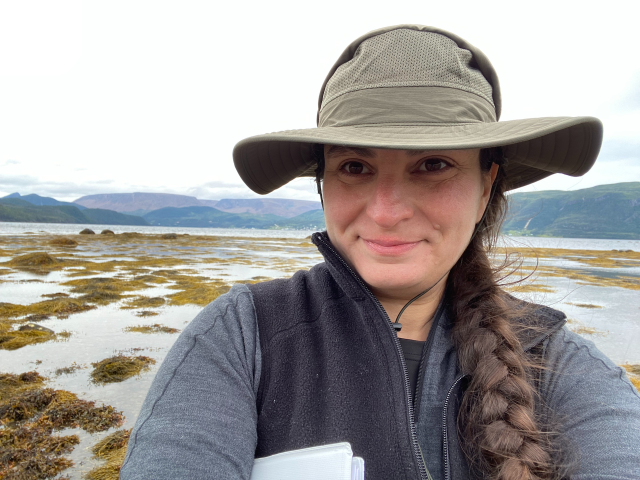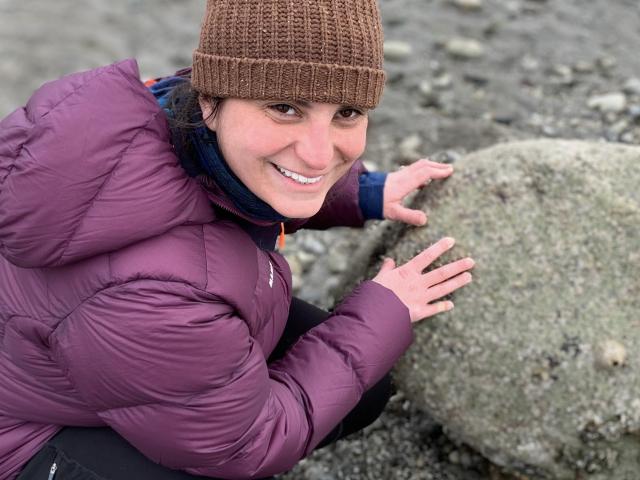Scientist and Educator: Meet Jessica Rebecca Bean ‘05 (CCS Biology)
Bean works at the edge of her comfort zone to explore new areas of scientific research and support K-16 informal science education and research

Jessica Rebecca Bean ‘05 (CCS Biology) knew from a very young age she wanted to be a scientist. Now a scientist at the UC Museum of Paleontology at the University of California, Berkeley, Jessica is engaged in collaborative scientific research with most of her time devoted to supporting K-16 and informal science education and research. This National Science Foundation grant recipient continues to bridge disciplines and take risks since her days as a student scholar at the College. Recently, Jessica had a conversation with CCS Interim Dean Timothy Sherwood.
“One of the great joys of this job is learning about all of the amazing and creative work our CCS alumni go on to do in the world after graduation. Jessica's professional accomplishments speak to the transformative impact of her days as a curious CCS student scholar, fostering positive change through creativity and community collaboration. Her work at the intersection of environmental justice and educational program development is such a powerful exemplar of what it means to be an interdisciplinary scholar and practitioner.”
—Timothy Sherwood, CCS Interim Dean

CCS: Why did you choose to come to CCS?
Jessica Rebecca Bean (JRB): I found out about CCS from a family friend. His daughter attended UCSB, and he thought I would be interested in the program. From a very young age, I knew I wanted to be a scientist. In high school, I decided that I wanted to study marine biology and was broadly interested in evolution and ecology. Although I was an avid reader, observer, explorer, and collector of shells and rocks, notably absent from my early education were the opportunities to engage in the process of science. For this reason, I took biology at the junior college next door to my high school between my junior and senior years, and my professor Dr. Brown encouraged me to find research opportunities as an undergraduate.
CCS: What was your favorite aspect or professor(s) or experience while at CCS?
JRB: Every quarter offered me opportunities to pursue my own broad interests in a way not typically available to undergraduates. As a first quarter freshman, I remember taking a course for all new biology majors with Professor Bruce Tiffney and Professor Armand Kuris. We learned how to navigate the UC library resources, and I spent many hours in the stacks in the library, reading scientific literature and writing about gastropod mollusks–which always fascinated me–and eventually became the focus of my research. As a CCS student, I was able to take upper division courses as a freshman, including invertebrate zoology, paleontology, stem cell biology, and deep-sea biology. During my first couple of years, I started supporting paleobotany research with Professor Tiffney, worked alongside graduate students in a plant genetics lab, and took a field ecology course that led me to start my own research project on intertidal snails with support from Professor Kuris and Professor Sally Holbrook. I also took courses in earth history and geoscience. It would be remiss for me to not mention that CCS literature and UCSB music ensemble courses greatly enriched my life because I had the flexibility to pursue my many interests.
CCS: If you attended graduate school, where and what did you study as a graduate student?
JRB: I received my Ph.D. at the University of California, Davis in the Department of Earth and Planetary Sciences (at the time called the Department of Geology). I studied and continue to investigate the responses of marine invertebrates to climate and environmental changes, specifically how growth patterns are related to changes in the shape and chemistry of shells, and how the chemistry of shells can be used to understand past environmental conditions. For this work, I use various laboratory and field methods and have collaborated with biologists, geologists, paleoclimatologists, and anthropologists.
CCS: How did your CCS education help you excel as a graduate student?
“It’s difficult to imagine that I would have had the same graduate school experience or career path without my time as a CCS undergraduate which helped me feel confident about working across disciplines and taking lots of risks as a lifelong learner.”
—Jessica Rebecca Bean ‘05 (CCS Biology)
I left CCS for graduate school with a broad foundation in biological and geological sciences, which allowed me to feel more comfortable starting graduate school in a Geology Department and pushed me to be more interdisciplinary in my research and teaching. Because I had been challenged to engage in scientific research as an undergraduate, I was able to take on the creative work of designing and implementing my Ph.D. project in ways that are not always expected of graduate students. Also, I was able to teach across disciplines, first as a teaching assistant and then as a lecturer and adjunct professor at UC Davis and Sacramento State University in both biology and geology departments throughout much of my graduate career. As a graduate fellow and then as a project manager at the UC Davis Bodega Marine Laboratory for the National Science Foundation (NSF) Graduate STEM Fellows in K-12 Education CAMEOS (Coastal, Atmospheric, and Marine Environmental Observing Studies), I designed and implemented programs for informal field and research laboratory settings to promote scientific literacy and environmental stewardship.
“I became very interested in understanding how to teach by engaging learners in the process of science, not just learning about science as an existing body of knowledge…”
—Jessica Rebecca Bean ‘05 (CCS Biology)
I became very interested in understanding how to teach by engaging learners in the process of science, not just learning about science as an existing body of knowledge, which allows everyone to understand how we know what we know about the world around us. My most recently awarded NSF grant involves designing teacher professional learning programs and classroom resources for teaching about climate change in both high school history-social science and science courses. It’s difficult to imagine that I would have had the same graduate school experience or career path without my time as a CCS undergraduate which helped me feel confident about working across disciplines and taking lots of risks as a lifelong learner.
CCS: Describe your career, profession, job. Does it relate to what you studied at CCS? If so, how?
“I often work at the edge of my comfort zone regarding my scientific background, but I’m thrilled to have constant opportunities to explore new areas of scientific research.”
—Jessica Rebecca Bean ‘05 (CCS Biology)
I am a scientist in the UC Museum of Paleontology at UC Berkeley. While I continue to do some collaborative scientific research, much of my time is currently devoted to supporting K-16 and informal science education and research. Broadly, my work aims to democratize science, support a public understanding of the process of science, and engage communities in locally relevant scientific investigations. Specifically, I lead the Understanding Global Change Project and I am the Director of Outreach and Science for the FieldScope Project, for which I support the integration of climate, environmental, and Earth science across curricula and community programs, and design materials that support data-driven learning and informed action in response to climate and environmental change.
I partner with scientists, educators, and community members across the country to co-design and implement formal and informal learning programs for youth and adult learners, including K-12 classroom teachers and community college instructors. I often work at the edge of my comfort zone regarding my scientific background, but I’m thrilled to have constant opportunities to explore new areas of scientific research. For example, right now, some of the projects I support involve using NASA Landsat data to understand the effects of urban greening to cool cities, environmental DNA (eDNA) analyzes to understand marine biodiversity and invasive species biogeography in the north Atlantic, Lyme disease and tick monitoring in the Appalachians, and community-driven water and air quality monitoring to address environmental justice issues in the Salton Sea region. This work requires creativity and collaboration to design opportunities that engage learners across ages in the process of science while exploring issues relevant to the well-being of their communities.
CCS: Does a memorable moment stand out from your time at CCS? If so, please describe the moment(s).
JRB: There were so many moments when I interacted with my CCS advisors, instructors, and other CCS biology and literature students, and found that I could so easily share my interests and engage in meaningful discussions, whether about a snail shell or a poem. I’m grateful to have spent four years in a program where I could so easily find myself in those moments.
CCS: What advice would you give to current and future CCS students?
“Explore and don’t be afraid to take risks or change course to find work that is meaningful to you.”
—Jessica Rebecca Bean ‘05 (CCS Biology)